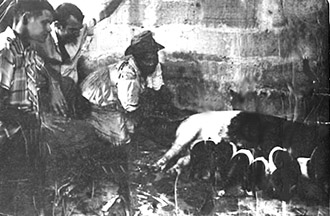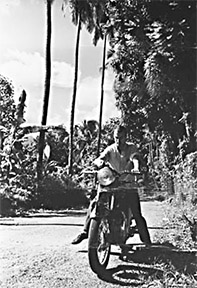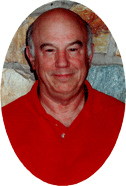“I Returned” by Jac Conaway (St. Lucia)
| A Writer Writes
I Returned Republished from PeaceCorpsWriters — 4/3/2004
I returned and it was like this. My son’s mother died suddenly. I hadn’t seen her for 22 years. It was strange to think of her dead or even to think of her as 44 years old. We were kids in so many ways. Now we are “old” and our son is “my” age.
Hours after I heard of the Peace Corps I joined, in the spring of 1961. I had just returned from East Pakistan (Bangladesh) where I had my world turned upside down and my eyes opened so wide I couldn’t grasp what I was seeing. In six profound months as a foreign exchange student, I was so astonishingly different that I thought I could never return to my small rural southern farm community. I was wrong about that, but I wouldn’t realize it for some years. I just had to keep going. My thoughts were tinged with idealism, and some concern (even determination) about avoiding Vietnam, but mostly I felt that I had no choice. I had to go. I went.
It took me about a month to grasp all of this and I made my move. I rented a shack (for $2 EC/mo) with an all purpose room and a “kitchen” outside the back door and I moved to my community of Desruisseaux. I worked and played and sang and walked dozens of miles a day and drank SO much beer and rum, — and the women — the St. Lucian women were wonderful. Two years later as I was leaving in June of 1963 I was told by a man in my community (what do I call such earthy people that live in the countryside? They tilled a bit of soil but they weren’t really farmers, they caught a few fish every now and then but even they wouldn’t call themselves fishermen. Peasant is surely not the right flavor even though they were all pretty — materially — poor. Who knows?) that I had arrived as a boy and was leaving a man. I cried at the feeling that passed between us in that moment. His name was Palton Joseph. He almost never wore shoes. He is a rich man. But, I’m ahead of myself. It is so hard to write an organized set of thoughts. EVERYTHING I say about my daily life in St. Lucia sets off so many musings. The Caribbean climate. “Another Goddamn beautiful day!” Sweat by the buckets till it wasn’t even noteworthy. The occasional reporter or PC checker-upper was a novelty to be endured.  Jac, second left, observing piglets being delivered Learning to swear or “date” in the local Patois. Trying to figure out what would work and what wouldn’t. Taking care of the baby pigs and chickens that were sent down by the Heifer Project until they could be placed in somewhat trained hands. The days went on and on and I was content with my life and seemed to be an integral part of my community. And then my son was born. How did this happen? I couldn’t fathom it! All of that rum and warm, summer like breezes in the evening and Calypso beats and rustling banana leaves and the women — the St. Lucian women were wonderful. But a child? I grew up fast. It was seven months since I had seen her and now I was hearing from my friends that she was saying she was carrying my child. I could not compute it. I kept asking my buddy (the head master of the local school who showed me all of the ropes in that small community) the same questions. And the answers all came down to two things. Women know about these things and I had better go and “speak” with her father (whatever that meant). I grew faster. I went and talked and time passed and I talked some more and my son was born and he was beautiful. I was in a dream world. I was a hero (“The first Peace Corps baby.” A distinction I was not all that attracted to.) and everyone wanted to buy me a beer and fix me food and congratulate me. I regressed! Time passed. The festival was over, the Christening was over and we all went back to work and pretty soon my time was over. I had to go “home.” I was very confused. In the time-tested West Indian way, I went: First to my parents home and then to train new PCV’s for a summer in Maine and to graduate school in Calif. and to my “Career.” But first I had to go back and get this straightened out. So I returned. Four years later, 1967 and not much seemed to have changed. The terraces that I had engineered and helped to construct were still there, but were not much appreciated by anyone but the Peace Corps photographer (They did stand out!). The kids that wanted to raise chickens had moved on to better things, and no one had helped them pass their skills on to another generation. Oh, well. Palton told me my son was doing well (I had kept in touch with his mother and sent money and holiday presents). I went to see them, glad I had come. His mother and I talked. She and he would come to Washington, D.C. with me and we would figure it out from there. Jesus Christ! I realized I had a lot more growing to do and it was going to happen NOW! They came and he went to school and time passed and he adjusted easily. I had a little harder time of it but I was in my own element so I eventually settled into the new life. She never did make it. It was too big a jump without a decent support system. I didn’t provide that. I was mostly interested in being a father, not a husband or even a lover. I didn’t give her enough help so one day she split and left him with me — in a quick 5 months my life had REALLY changed. I wasn’t all that ready even after that much effort and warning. We lived and had some good times and I was happy and also burdened but we pulled together and, in time I met a woman and was married and had a daughter and my son flourished in some ways and showed a lot of stress in other areas of his life. At age 16 things came to a head and it became clear that he needed to go and find his mother. She had not contacted me for about two years after leaving. I had written to her father in Belle Vue several times but he said he didn’t know where she was. She was young and apparently had just wanted to be free so she had gone to Barbados. Eventually she returned home to St. Lucia and we had reestablished communication and so she knew a bit about our life and we knew a bit about hers — but not much. My son had to go and see for himself as I knew he probably would. After a 12 year long eternity he got on a plane and went by himself. After a week he called (which was quite a feat in those days before modernity hit St. Lucia) and asked how he was supposed to get home. I smiled and suggested he use the return half of his ticket. He laughed and decided that was a good idea. He still needed me for some things. He came back and was changed and life went on. He told me a bit about it but mostly we just went on with our life. At age 26 (Feb. 1989) he went to see his mother again and this time was much more open about his experiences. He had other brothers and sisters and uncles and aunts and cousins and friends and was full of the new sights and thoughts and feelings. The talk was nice and warm. His sister on this end was full of questions and they talked so much! Then it happened — on a Wed. morning in August 1989 I got a call from his 19-year-0ld brother in St. Lucia. She had died suddenly in the early morning. Would I please tell my son? He was somewhere on a camping trip between Denver and Santa Fe with my daughter and some friends but I left a message and breathed very deeply and decided to go back — Again, it happened so fast and I wasn’t ready but was on my way anyway. My son flew immediately from Denver. His sister had flown back home the next morning and we were flying the next day to St. Lucia. It was so different to make those arrangements. The travel agent knew where St. Lucia was this time, but wanted to give us a vacation package with hotel and rental car thrown in. Was this really St. Lucia? I almost felt as if I were going to a strange new land. We landed and I was back at almost the identical spot where I had first set foot on St. Lucia at Vigie airport 28 years earlier. This time there was no band. We were met by my son and his brother and driven to his mother’s apartment in Castries and then I knew it really was St. Lucia. It was hot and not very clean and very crowded and noisy. I was told on the way from the airport that Robert Francis, a butcher in Desruisseaux who was arrested several times while I lived there for stealing and butchering other people’s animals, had just been in jail once more for the same activity. We laughed at “the joke” and I felt at home. The smells and noise and Patois (though English is far more prevalent in the streets than “before”) and vendors and heat and humidity and dirt. I felt at home. It was night so we ate (boiled banana’s, cocoa, bread and of course a Heineken beer now made in St. Lucia) and slept and went down to the country the next morning. There is no way to convey the feelings that went through me as we passed Kentucky Fried Chicken on Bridge St. in the middle of Castries. I knew things had changed but I wasn’t ready for that one! I didn’t know whether I felt at home or not. A heart stopping 53 minutes later we drove through Desruisseaux past a Shell station. Other than that addition, there were just a few new houses by the road. We stopped on the way to speak with Robert Francis who had gotten out of jail the day before. He was “by the sea” so we went on. I felt at home. It was two days until the funeral and preparations were well under way. I hugged my son’s grandmother and spoke to her in a very insecure Patois. She understood and replied in equally insecure English. We laughed. My daughter almost fainted from the sight and smell of a skinned goat lying on the table next to a dishpan full of blood (soon to be made into a delicious pudding) but she pulled through and seemed to make acquaintances easily. As we drove back to Castries late that night (too many relatives had arrived for the facilities in Belle Vue to sleep everyone and anyway it is now so easy to get to Castries) she laid her head on my shoulder and asked, with anguish in her voice, what culture shock was. We had a nice talk. I quickly got used to saying that it had been too long to remember peoples names but I never got over feeling guilty about it. I was approached by one big strapping man after another asking if I remembered them. Most of them turned out to remember me as their teacher in one of the times I tried to teach in the third form at the local school or as their mentor with a chicken raising project (none of which were in evidence anywhere I went. I didn’t ask.) or as a neighbors kid. It felt very good. I was back home. His mother’s siblings had all made good in one way or another. They came from England and Scotland and Brooklyn and St. Croix and also just from Belle Vue. They were professionals and we reconnected and it felt very good. I felt at home. The funeral happened and “everybody” came and I had to feel guilty all day. I was astonished that I could still conjure up a coherent sentence in Patois (well, one or two anyway) and was happily congratulated on my effort. The next few days were a whirl and suddenly, I realized that I had seen only a very few areas of the island so I rented a car and took my kids on a day long tour of my former haunts. Memories and acquaintances washed by and over me. Langostina and plantain in the market. Heineken beer everywhere, some of it cold even. Many more radios sending out the beat from those thatched houses than “before.” The stunning beauty of the sea and mountains and lush and wild tropical flora. I realized that I was weaving back and forth between being a tourist and feeling myself at home. It spooked me more than once that day. Driving on the left side of the road was interesting. I had to keep consciously reminding myself not to get too confident because the “familiarity” was not of the present reality. My reflexes were still well trained to right side driving. That disorienting need to keep a distinction between the world of St. Lucia inside me from 26 years before and the one outside of me at the moment left me wondering about that elusive definition of “reality.” I went on. The car broke down and we would have to get a replacement. I was unsure of whether that could happen in St. Lucia. Then I snapped back to the present and realized that I had rented it from Avis and, of course they would replace it. But, that meant hitchhiking through some back country to get to Vigie and again, I felt at home. I was picked up by someone who knew me and we had a great talk and he went out of his way to get me where I needed to go. We eventually had to leave. My kids were ready, I wasn’t. Or at least it seemed like I wasn’t, but I was very mixed up. I had visions of moving back and making my living via modem. It was going to be hard to come back to the present. I got on the plane and have not returned since. The ties are there in the heart and in the reflexes and in the blood line. I am a St. Lucian in some way I can’t now put into words. Maybe I never will.
|
 I went to St. Lucia, West Indies as an agricultural extension specialist. St. Lucia wasn’t ready. It had all happened too fast for everyone really, but I was in such a hurry I didn’t see that until much later either. Our housing was not ready, no one knew how to pay us or find us transportation. I was told a lot about tropical and St. Lucian agriculture, but almost nothing about what was expected of me. I loved it!
I went to St. Lucia, West Indies as an agricultural extension specialist. St. Lucia wasn’t ready. It had all happened too fast for everyone really, but I was in such a hurry I didn’t see that until much later either. Our housing was not ready, no one knew how to pay us or find us transportation. I was told a lot about tropical and St. Lucian agriculture, but almost nothing about what was expected of me. I loved it!
I was in St Lucia in 1978 and 79. I know what you mean about the way things have changed there. But I loved my stint on that beautiful island and am glad to hear of yours. Good story!,
This is a beautifully written story, and a learning experience for me about St. Lucia. Is it published and where can I find it?
It is published as far as I know, only on this site. But write him.
Jac and John, Thanks for sharing another interesting Peace Corps story. It leaves me wanting to read more and that’s a good thing.
For the past 58 years I thought Moke Chee’s and my son, Jim, born on February 2, 1965 and our daughter, Sheana, born on December 28, 1965 were the first children born to a PCV and local national.
Jim is now the father of two and grandfather of one and is a neurosurgeon practicing in Kansas. Sheana is the mother of three, two of which are in med-school and the baby is just graduating from high school and, I am pleased to report, has turned down a music contract to attend college,
Moke Chee and I will celebrate our sixtieth wedding anniversary on September 10th of this year and our Peace Corps romance is chronicled in, “Finding Miss Fong,” with an anticipated July.August publication date
Be well, Jim Wolter, Malaya I. ’61-’66.